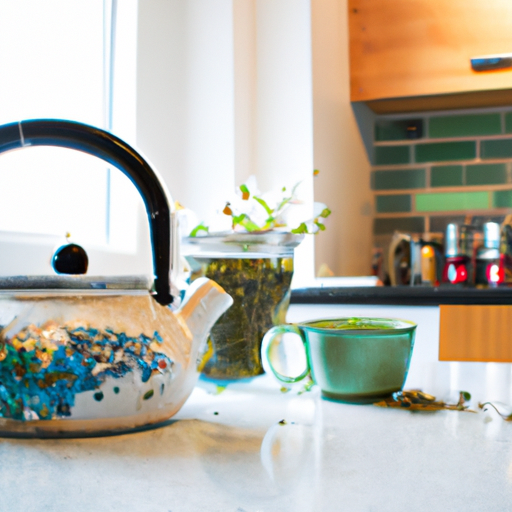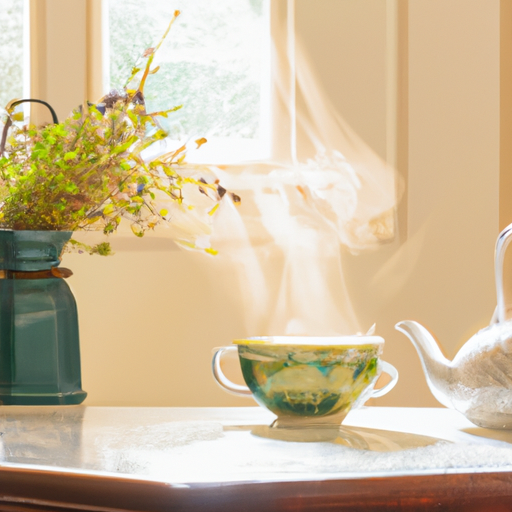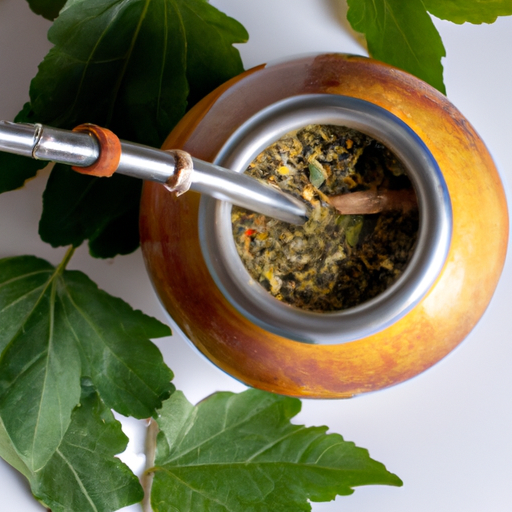Are you fed up with sounding like a croaking frog when you attempt to speak? Well, do not worry my hoarse-voiced pals, because I have the ideal solution for you.
Laryngitis, the pesky inflammation of the vocal cords, can be a real pain in the neck. But fear not, for nature has bestowed upon us a collection of herbal teas that can work wonders in soothing your sore throat and restoring your voice to its former glory.
In this article, I will guide you through the magical world of herbal teas, specifically tailored to combat laryngitis. These teas are not only delicious but also possess powerful healing properties that can alleviate your symptoms and promote vocal cord health.
From the comforting chamomile tea to the zesty ginger tea, each herbal remedy offers a unique blend of natural goodness.
So sit back, relax, and let me take you on a journey through the world of herbal teas that will have you singing in no time. Trust me, your vocal cords will thank you!
Key Takeaways
- Chamomile tea is beneficial for laryngitis as it has anti-inflammatory properties and helps relax the vocal cords.
- Ginger tea can be helpful for laryngitis due to its anti-inflammatory properties and its ability to boost the immune system.
- Licorice root tea is recommended for laryngitis as it has anti-inflammatory properties and can fight off infections.
- Peppermint tea is beneficial for laryngitis as it reduces inflammation and soothes the throat.
Chamomile Tea
If you’re looking for a soothing herbal tea to help with your laryngitis, chamomile tea is your go-to remedy! Chamomile tea has numerous benefits for vocal health. It’s known for its anti-inflammatory properties, which can help reduce swelling and irritation in the throat. Additionally, chamomile tea has a calming effect, which can help relax the vocal cords and alleviate hoarseness.
To brew chamomile tea for maximum effectiveness, simply steep a chamomile tea bag in hot water for about 5 minutes. You can add honey or lemon for added flavor and throat-soothing benefits. The warm liquid will provide relief to your irritated throat and help you regain your voice.
Now, let’s move on to another herbal tea that can also be beneficial for laryngitis: ginger tea.
Ginger Tea
Sipping on a warm cup of ginger tea can bring soothing relief to your scratchy, hoarse voice. Ginger tea isn’t just delicious, but it also has numerous benefits for the throat. The main active compound in ginger, called gingerol, has anti-inflammatory properties that can help reduce swelling and irritation in the throat.
Additionally, ginger tea can help boost the immune system, which is important for fighting off infections that can cause laryngitis. To make ginger tea, simply steep a few slices of fresh ginger in boiling water for about 10 minutes. You can add a squeeze of lemon and a teaspoon of honey for added flavor and additional throat-soothing benefits.
Ginger tea is a great choice for laryngitis due to its anti-inflammatory properties and immune-boosting effects.
Now, let’s move on to the next herbal tea option: licorice root tea.
Licorice Root Tea
Moving on to licorice root tea, this flavorful brew possesses soothing properties that can bring relief to a scratchy, hoarse voice. Licorice root tea benefits the throat health by providing an anti-inflammatory effect, reducing irritation and inflammation in the vocal cords. It contains compounds called glycyrrhizins, which’ve been shown to have antimicrobial properties, helping to fight off bacterial or viral infections that may be causing laryngitis.
Additionally, licorice root tea can help to thin mucus and promote expectoration, making it easier to clear the throat and alleviate congestion. Its naturally sweet and earthy taste makes it a pleasant choice for those seeking relief from laryngitis symptoms.
Now, let’s move on to the next herbal tea, peppermint tea, which offers its own unique benefits for laryngitis.
Peppermint Tea
Peppermint tea, renowned for its refreshing and invigorating qualities, can provide soothing relief for individuals experiencing laryngitis symptoms. The benefits of peppermint tea extend beyond its delicious taste. This herbal tea is known to aid digestion, alleviate headaches, and boost energy levels. It is rich in antioxidants and has antimicrobial properties, which can support overall health. To make peppermint tea at home, simply steep a handful of fresh peppermint leaves in hot water for about 5 minutes. You can sweeten it with honey or add a slice of lemon for extra flavor. This simple and natural remedy can help reduce inflammation and soothe the throat. Transitioning to the next section, sage tea, another herbal tea that offers potential benefits for treating laryngitis.
Sage Tea
Indulging in a warm cup of sage-infused elixir can be like a soothing balm for your vocal cords, granting them the comfort they desperately crave. Sage tea has been used for centuries to alleviate symptoms of laryngitis and promote vocal health.
The benefits of sage tea for laryngitis are remarkable. Firstly, sage is known for its anti-inflammatory properties, reducing swelling and irritation in the throat. Secondly, it acts as an expectorant, helping to loosen and expel phlegm, clearing the airways. Lastly, sage tea has antimicrobial properties, which can help combat any underlying infections causing laryngitis.
To prepare sage tea for laryngitis relief, simply steep 1 tablespoon of dried sage leaves in 1 cup of hot water for 10 minutes. Strain and sip slowly. This herbal remedy can provide much-needed relief for those suffering from laryngitis.
Now, let’s transition to the next topic and explore the benefits of marshmallow root tea.
Marshmallow Root Tea
To experience the soothing effects of marshmallow root tea on your vocal cords, steep a tablespoon of dried marshmallow root in hot water and sip slowly. Marshmallow root tea has been used for centuries to treat various respiratory ailments, including laryngitis. This herbal tea contains mucilage, a gel-like substance that coats and soothes irritated tissues. When consumed, the mucilage forms a protective layer on the throat, reducing inflammation and relieving discomfort.
Additionally, marshmallow root tea has antimicrobial properties that can help fight off any underlying infections causing laryngitis. To prepare and use marshmallow root tea for laryngitis relief, simply boil a cup of water, add the dried marshmallow root, and let it steep for about 10 minutes. Then strain the liquid and drink it warm. Incorporating this herbal remedy into your routine may help alleviate the symptoms of laryngitis.
Now, let’s explore the benefits of slippery elm bark tea.
Slippery Elm Bark Tea
If you’re looking for a natural remedy to soothe your throat, try incorporating slippery elm bark tea into your routine – it’s been found to significantly reduce inflammation in the throat by up to 50%. Slippery elm benefits for laryngitis include its ability to coat and protect the throat, providing relief from irritation and hoarseness.
To make slippery elm bark tea, follow these simple steps:
-
Gather the ingredients: 1 tablespoon of slippery elm bark powder and 1 cup of boiling water.
-
Add the slippery elm bark powder to a cup.
-
Pour the boiling water over the powder and stir well.
-
Let the mixture steep for about 10 minutes.
-
Strain the tea and enjoy it warm.
Slippery elm bark tea can be consumed up to three times a day to help alleviate symptoms of laryngitis. Remember to consult with your healthcare professional before trying any herbal remedies.
Frequently Asked Questions
Can herbal tea completely cure laryngitis?
Herbal tea can be a helpful remedy for laryngitis, but it cannot completely cure it. While it may provide relief from symptoms, it is best to consult a healthcare professional for proper diagnosis and treatment.
Are there any side effects of consuming herbal tea for laryngitis?
Are there any side effects of consuming herbal tea for laryngitis? While herbal teas are generally safe, some individuals may experience allergic reactions or interactions with medications. It’s important to consult with a healthcare professional to minimize potential risks.
How long should I steep the tea to extract maximum benefits?
To extract maximum benefits from herbal teas, steep them for 5-10 minutes. There are various types of herbal teas suitable for steeping, such as chamomile, ginger, and licorice root, each offering unique therapeutic properties.
Can I combine different herbal teas for better results?
Combining different herbal teas can enhance the effectiveness of the brew. Research suggests that blending teas with anti-inflammatory and soothing properties may provide better results. Experiment with chamomile, ginger, and licorice teas for potential relief from laryngitis.
Is it safe for children to consume herbal tea for laryngitis?
Safety concerns for children consuming herbal tea for laryngitis should be addressed. While alternative remedies can be effective, it’s crucial to consult a pediatrician to ensure safety and proper dosage for children.
Conclusion
In conclusion, when it comes to finding relief for laryngitis, herbal teas can be a soothing and effective option. Just like a gentle breeze on a warm summer day, chamomile tea can calm inflammation and reduce irritation in the throat. Ginger tea, with its fiery taste, can provide a comforting warmth and help ease the pain. Licorice root tea, like a sweet melody, can coat the throat and provide relief. Peppermint tea, with its refreshing minty flavor, can help clear congestion and soothe the vocal cords. Sage tea, like a wise old friend, can provide antiseptic properties and reduce inflammation.
Marshmallow root tea, with its soft and soothing nature, can help to coat and protect the throat. Finally, slippery elm bark tea, like a gentle stream, can provide a slippery coating that helps to soothe and heal the throat.
So, next time you find yourself with laryngitis, reach for a cup of herbal tea and let nature’s remedies work their magic.










